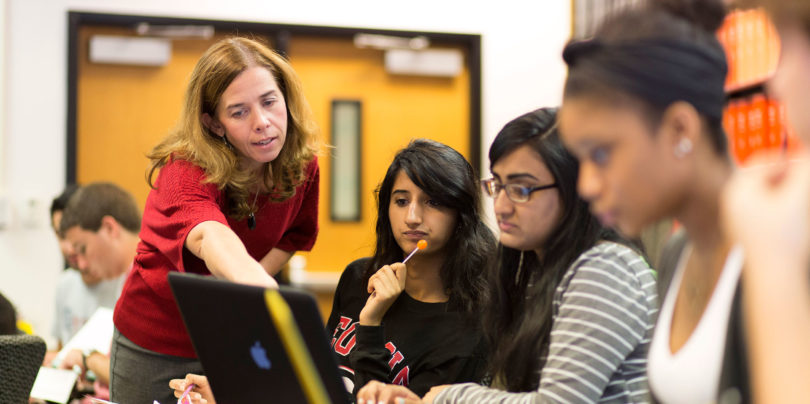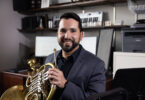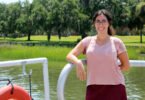Paula Lemons, associate professor of biochemistry and molecular biology, uses findings from her research on science education to design curricula for her classes and tailor her interactions with students to enhance their learning outcomes.
Where did you earn degrees and what are your current responsibilities at UGA?
I earned a Bachelor of Science degree in biology at Southern Wesleyan University in 1994. In 1999, I earned a Ph.D. in biochemistry at University of Kentucky. My postdoctoral work took place at Duke University from 1999-2001, and it was at Duke where I started my teaching career and began biology education research. At UGA, I serve as associate professor of biochemistry and molecular biology in the Franklin College of Arts and Sciences. I do biology education research and teach “Introductory Biochemistry” (BCMB 3100). I also serve the university by working with my colleagues to promote undergraduate education research in science, technology, engineering and math and to help UGA faculty translate education research into practice in our classrooms.
When did you come to UGA and what brought you here?
In 2007, during a transition in my career, I met Peggy Brickman, Josiah Meigs Distinguished Teaching Professor of Plant Biology, at a conference. She told me that UGA might be hiring a new biology education researcher. I said, “Great! Let me know what happens!” I thought I would never hear from Peggy again, but she wrote me a few months later to let me know about the search. I applied and got an interview. At the interview, I liked what I learned about UGA. In particular, I was drawn to the opportunity to pursue biology education research on the tenure track alongside a fantastic group of colleagues that, at that time, included Peggy as well as Norris Armstrong and Kathrin Stanger-Hall. I started my position in 2009. The move to UGA was a great decision; the opportunities continue to amaze me.
What are your favorite courses and why?
My favorite course is “Introductory Biochemistry” (BCMB 3100). I started teaching BCMB 3100 a few years ago, and moving to this course allowed me to prioritize changing some of the strategies I use in class as well as the way I assess student learning on exams. Also, I love BCMB 3100 students. They like science and plan to pursue careers in engineering, health care or research. They are mature learners and have developed the savvy to adapt their study strategies based on a professor’s requirements. Finally, they are highly motivated and, when given the chance, they show that they like to learn for the sake of learning. These characteristics match my teaching style well.
What interests you about your field?
I am a biology education researcher, which means I use social scientific methods to investigate the teaching and learning of biology. There are two things that most interest me about my field of research. First, my research focuses on learning among undergraduates, and I often read literature about the developmental aspects of learning from little children to older adults. Although it is common for people to think that learning should be quick and easy, the literature and my research reveals that learning is difficult and lifelong. I never cease to be intrigued by the learning process. Second, I most often use qualitative methods in my research, and these methods are meant to provide researchers with deep, contextualized perspectives of the people or phenomena under investigation. I love the hunt to understand the subtleties and details that influence college education.
What are some highlights of your career at UGA?
There have been so many, but here are a few, in no particular order:
- Participating as a guest at student functions like sorority dinners for faculty and Dawg Discovery Camp.
- Working with a fantastic group of colleagues in UGA’s Biology Education Research Group.
- Hanging out with Hairy Dawg during a class party at my house.
- Attending the UGA vs. Clemson football game in fall 2015. Go Dawgs!
- Receiving the USG Board of Regents’ Excellence in Teaching Award in 2015.
- Receiving tenure and promotion to associate professor in 2014.
- Teaching and mentoring thousands of fantastic UGA students.
- Receiving the Science Editor’s Choice for one of my publications, which I co-authored with my husband and UGA professor Derrick Lemons: Lemons, P. P. and Lemons, J. D. (2013) “Questions for Assessing Higher-Order Cognitive Skills: It’s Not Just Bloom’s.” CBE-Life Sciences Education 12(1): 47-58.
- Getting my first big grant from the National Science Foundation.
How does your research or scholarship inspire your teaching, and vice versa?
My research directly influences my teaching. As I learn how undergraduates think about biology and how they solve problems, I can immediately use that knowledge to design curricula for my classes and tailor my interactions with students to improve their learning. Likewise, new research questions and insights into data analysis often emerge while I’m teaching or collaborating with other faculty about teaching.
What do you hope students gain from their classroom experience with you?
I have four broad goals for students I teach. I want students to:
- Demonstrate understanding of biological concepts and principles.
- Develop skills in scientific problem solving.
- Describe multiple examples of the real-life relevance of biology.
- Be inspired to keep learning biology.
To help students achieve these goals, I use five guiding principles to help me decide how to structure my classes:
- Focus on fundamental concepts, and de-emphasize irrelevant details.
- Provide opportunities every class period for students to practice discussing and writing about biological concepts.
- Provide opportunities every class period for students to solve problems.
- Create learning objectives for every class period and share them with students. Align in-class activities and exams with the learning objectives.
- Create a classroom atmosphere that is friendly, supportive, challenging and fun.
Describe your ideal student.
I used to think in terms of ideal students, but the more I’ve mentored students in research, the more I’ve learned that every student brings unique talents and skills to the table. The fun part for me is to give students opportunities to show their talents and skills and then to work with those talents to build a classroom or research community where individuals can shine and can see the importance of their contribution to a project.
Even though every student is unique, classroom and research communities function best when students are hard working, ethically responsible, committed to the good of the community, receptive to feedback and inspired by the opportunity to learn, whether it be through reading, discussions or original research.
Favorite place to be/thing to do on campus is…
I love my office and lab in the back corner of the Davison Life Sciences Building. I have lots of windows, and I often have a view of students taking the path behind the building to and from classes. I spend most of my time on campus in the office working at my computer and in meetings with students and lab members. When I get out of the office, I often meet up with students or colleagues at the picnic tables outside the Creamery; I enjoy grabbing an ice cream cone and soaking up the sunshine over conversation. Occasionally I enjoy going for a run around the perimeter of campus, and every now and then I work at Jittery Joe’s in the MLC.
Beyond the UGA campus, I like to…
I like to hang out with my family—my husband Derrick and sons Nathaniel and Zachary. We enjoy participating in the kids’ sports events. We also like to play basketball in the driveway, where my kids routinely beat me in one-on-one and Around the World. In fact, whether I’m playing with my family, friends or alone, I love sports. Most of the time I run, but I also welcome the opportunity to play softball, tennis or even kayak. Our family also prioritizes travel. Our most recent trip was to England and Scotland.
When I want to be still, I enjoy a good book, particularly nonfiction. My favorite books lately are “DaringGreatly” by Brené Brown—who also does qualitative research—and “C.S. Lewis” by Alister McGrath. In the fiction realm, I fell into the dystopian society genre with the “Hunger Games” series by Suzanne Collins.
Community/civic involvement includes….
I am involved in my church, Temple United Methodist, where I teach the senior high Sunday school class, teach the Science Zone every summer for Vacation Bible School, and sometimes speak at church gatherings. One of the ministries our church contributes to is Our Daily Bread Community Kitchen. A few times a year we prepare and serve meals for Our Daily Bread, and we have also run the Action Dash 5K race.
I also contribute time to the science curriculum at Malcom Bridge Elementary School. Other PTO members and I recently worked together to renovate a classroom and turn it into a science lab. Since then, we have started the Super Scientist Program. In the Super Scientist Program, community volunteers including parents and UGA graduate students provide a hands-on science activity for Malcom Bridge students several times a year.
Favorite book/movie (and why)?
My favorite book is the Bible, because it tells the story of God’s unfolding revelation throughout history and through Jesus Christ. Because I follow Jesus, the Bible provides the organizing framework for my life.
Two of my favorites movies are “Out of Africa” (1985) and “Les Misérables” (2012). “Out of Africa” is a favorite because I’m a Meryl Streep fan, and this was the first Meryl Streep movie I saw. Also, “Out of Africa” contains my favorite line from any movie. Streep playing Karen Blixen narrates over a scene from an African hillside to begin the movie with, “I had a farm in Africa at the foot of the Ngong Hills…” “Les Misérables” is a favorite because of the story of grace and redemption. With both movies, the musical scores move me. On the less serious side, I enjoyed “Alien” (1979), “Outbreak” (1995), “Avatar”(2009) and “Thor”(2011).
Proudest moment at UGA?
My proudest moments at UGA have been when something significant happened to my students, when my students express they’re appreciation for me, and when an idea I’ve worked hard to develop comes to fruition. Several of my students have been named “Amazing Students” and received important recognitions and rewards like the Goldwater Scholarship or Center for Undergraduate Research (CURO) awards. Students have given me certificates of appreciation and anonymously thanked me through the Center for Teaching and Learning Thank-a-Teacher program. Recently I received a major grant from the National Science Foundation to study biochemistry problem solving among undergraduates, and I’m currently working with colleagues to build a Center for STEM Education Research at UGA. These moments make my job fun and rewarding.
Is there anything else you’d like to add?
It’s great to be a Georgia Bulldog!







